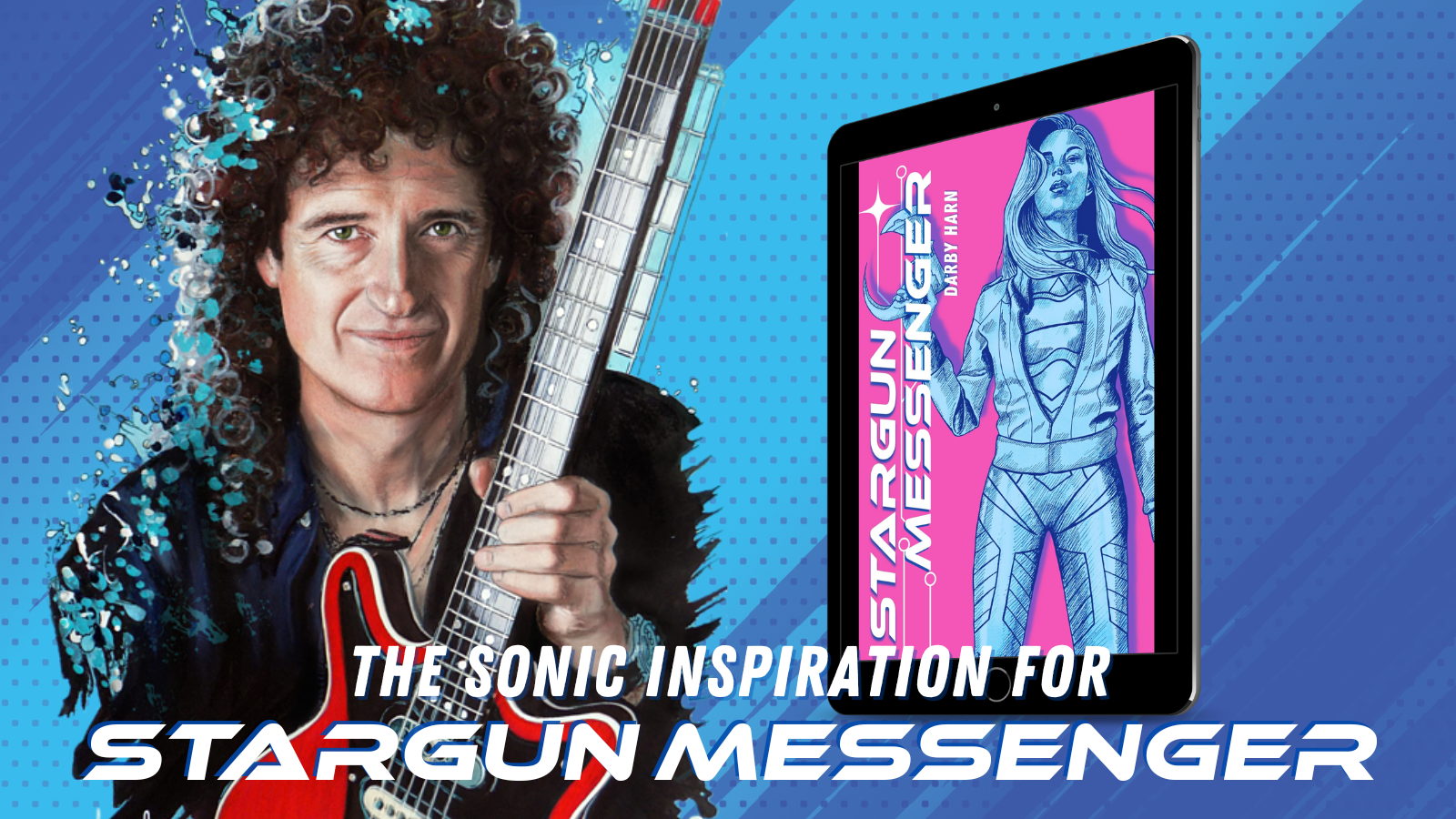Brian May signed a notebook I’d been keeping in August 1998. In that notebook were pages and pages of ideas, sketches, and writing about an idea I was calling Wandering Star. I was obsessed with this idea and would be on and off for the next twenty-five years. That book has finally come out in 2023.
It’s now called Stargun Messenger.
You may be wondering why I asked the legendary Queen guitarist to sign a notebook and not say, literally anything else, like an album, CD, or what have you. If you’ve read Stargun Messenger, it’s probably not that surprising (Astra Idari rides around in an OVL-99 Red Special starplane). My brother and I are huge Queen fans. We saw Brian for the first time in 1998 at Rockstock outside Chicago, but not the last; we’ve seen him thirteen times since then. Aaron had Brian sign his shoulder, under a tattoo he had of the Queen crest. Aaron then had the autograph tattooed onto his arm. His story is much cooler than mine, but I think I may have gotten something equally rewarding from the experience.
I sought an artistic blessing from Brian for this story which even in its infancy meant so much to me. I do think Brian’s generosity – and I think slight bewilderment – did grace the story. This little touch of magic from a true hero of mine – an artist, a scientist, a lover of all things space – helped keep this flame alive through long, dark, and cold periods over many years. Looking back, it’s oddly fortuitous and poetic. Sound shaped this book in strange ways.
Needless to say, the book has gone on a journey. The book started out as a screenplay in 1998. The story is fundamentally the same: Astra Idari is a hired gun who protects filamentium, the only element which fuels starships faster than light. When she meets Gen Emera, a living star, Idari discovers where it really comes from. This revelation kicks off a fast, funny, epic with a lot of heart.
I wrote the book as a novel in 1999 or 2000 and was querying agents after college in 2001. This is staggering looking back on it because the book wasn’t good, but I actually got a few bites. Agents taking any interest in this embryonic novel speaks I think to the core story’s strength, which I always knew and sustained the effort of trying to overcome my own limitations. From there, Stargun Messenger morphed, evolved, devolved, and died so many times I forget. Somewhere around 2010, I was writing something called After Light, which was an attempt to come at the idea via a sci-fi 80s Brat Pack movie.
I don’t know, either.
I struggled endlessly with the story for many reasons. Foremost among them, I didn’t know I was autistic. I didn’t know what impact this had on my creative process, even though this story was trying to tell me. I wouldn’t make this realization – and the discovery that Idari (an android overwhelmed by sensor(y) inputs) had always been an autistic avatar – until around 2018. I wrote about my journey here. Once I did understand, the knots in my head untangled and so did the cage this story had been in. I owe a huge debt to a few people for helping me realize myself. There aren’t words, really, and only feeble actions. One of the most important figures in helping me understand myself better is Essa Hansen.
Essa is also another key inspiration for Stargun Messenger.
She is the author of The Graven Trilogy, a staggeringly inventive space opera series beginning with Nophek Gloss. Essa is also a Sound Designer for Skywalker Sound, with credits on movies like Avengers: Endgame (you may have heard of it). I visited Essa and Skywalker Ranch in 2018. For a Star Wars nerd, there simply aren’t ways to describe how wonderful this was. As monumental as the trip was for the five-year-old nerd in me, its greatest benefit had to do with Stargun Messenger. Going to Skywalker, reconnecting with this thing that meant so much to me as a kid, coming into myself finally as an autistic person, all of that combined to turn me back to the novel. The passion, the energy, and finally the understanding, all led me to dust off the idea for a new go.
The first attempt was awful.
Essa will tell you. So will everyone else who read it. But the book had a pulse. I kept tinkering with it after, still struggling, still doubting, still going back over myself. The book lurched dramatically away from the core story into something that was good, but as my writing matured, as my sense of self did, I finally understood. This novel took a few more years to cure, and some of that was trying to find an agent and publisher, even if I knew in the back of my mind I was always going to do it myself. When the last rejection came in 2022, I had already laid the book out. I had already mentally committed to the book leaving orbit in 2023 because I finally knew she was done. She was ready.
The book’s journey is far from over, of course. Someday, it may involve sound and music in other media. Nothing would make me happier. Sound and music play important roles in the novel. Besides some great Queen Easter eggs (DEEP cuts), Idari is a huge fan of a singer named Delicia Faero, a ‘startronic’ muse who embodies a little (or a lot) of Bowie. Faero’s amorphous identity echoes Idari’s journey and the book’s, and the understanding that the journey is never quite over. You are always arriving. Stargun Messenger I think will continue to evolve, in ways I can’t imagine. I hope everyone who comes to the story goes away with a little of the magic and grace that has touched the book.
